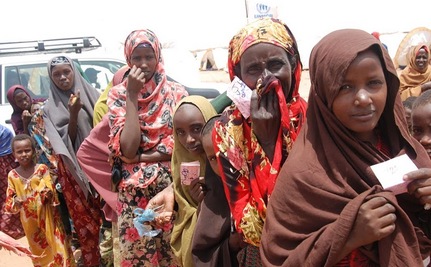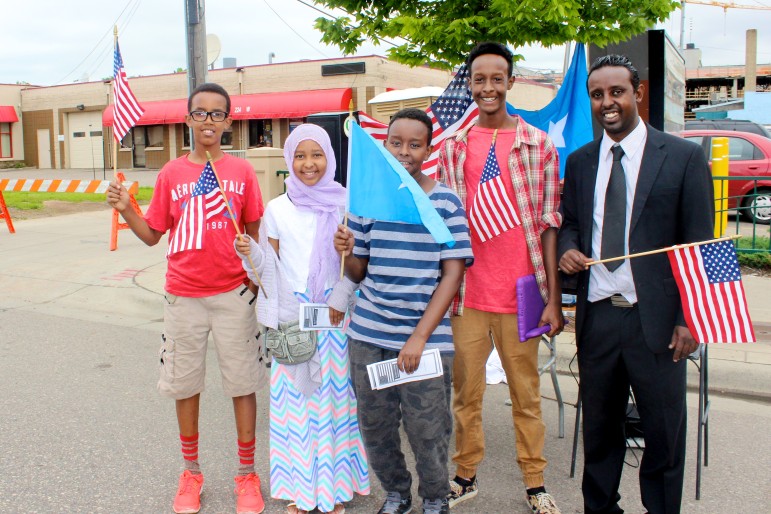Dear readers, I wrote this because in my teaching I discovered that feelings of sorrow can cause perceptions to narrow. That sometimes there is a problem with pity.
“Teacher, come here!” “Teacher, I need help!” I race from one student to another, my face shiny with perspiration, answering questions that never seem to stop. After class, when my supervisor comes in to talk with me, I am so wound up that I can’t stop moving, can’t stop walking around the classroom while she tries to converse with me.
How can a teacher meet every student’s needs? She cannot. I learned that the hard way when I taught all levels of English as a Second Language (ESL) in one small classroom. Eighteen students, whose skills ranged from recent arrival who spoke no English and didn’t know how to write in her own language, to college-educated architect who could read and write English, but had seldom spoken it.
My students, mostly from Somalia, were mothers of preschoolers in a unique St. Paul Public Schools program called Family Literacy. In it, moms and their children played together for a half hour, and then, while their tots attended an English-speaking preschool (allowing them to quickly become bilingual), the moms received English instruction.
My classroom was loud, much louder than I had thought it would be, given I was teaching adults. Many of the mothers had never sat in a classroom before, and they were as needy and excitable as their children. “They have had to fight for everything they’ve got,” a more seasoned teacher told me.
War had interrupted most of my students’ lives, ravaging their homes, making them nomads, and placing them for years in refugee camps. Despite trauma and uncertainty, however, my students had grabbed onto English, soaking it up as children do, without referring to written materials. Their capabilities—and their desire to learn and improve—amazed me.
There was one student I will never forget. Shukri looked sixty but, given she had a preschool-age daughter, she was probably at most in her forties. She walked with a limp and her right eye was milky and unseeing, her face scarred, probably due to an explosion. It was hard for me to look at her, and she rarely demanded I do so, keeping her face down, and rarely meeting my eyes, even when I asked for participation. I wanted to check in with her, wanted her to claim her share of my time, but overworked as I was, days passed and this didn’t happen.
Shukri made me think of the word, miskeen, an Arabic word also used in Somalia and Ethiopia. From long ago exposure to Arabic, I knew that miskeen means humble and downtrodden. You can say miskeen to express regret if someone experiences difficulties, and you can exclaim, “Miskeen!” when you mean, “you poor thing!”
One day Shukri came to class early and I had a chance to chat with her. I asked her about her family and she told me she had nine children, but what she said next surprised me: four were still living in Somalia. I guessed they must have been grown or almost grown, but I wondered how she could cope with this loss. I wondered if she’d been just a girl when she’d had them; another of my students was just 32 but had a 19 year old son. After that, whenever I glanced at Shukri, her head bent down over an assignment, I had to fight tears.
On the last day of the school year, I was sitting at a table in the preschool room before lessons started. Teacher Marilyn was putting out paint cups and Safia was sitting next to her daughter, Salma, who was finger painting.
Shukri began rustling in her purse, and then pulled out her phone. She found a photo and showed it to Marilyn and me. “This my daughter, Amina,” she told us. Wearing a colorful, stretchy hijab, the little girl was holding up some kind of certificate and smiling.
“We have the kindergarten graduation tomorrow,” Shukri said. “Amina, she get to stand and speak to the others.”
“She’s going to give a speech?” Marilyn asked.
“Yes, yes,” with an emphatic nod.
“That’s great!” we exclaimed.
“Because she know most of languages,” Shukri added.
“Which languages?” I asked.
“She know Somali, Arabic and English. And now she also know Spanish.”
I beamed at Shukri, and she caught my eye and grinned.
Wow! What an achievement for a little girl! It occurred to me that American foreign language skills are no longer as miskeen as I’ve long assumed. Amina and thousands of other immigrant children are growing up here, multi-lingual–and no doubt skilled in cross-cultural diplomacy. I recalled teachers telling me Somali parents “are right there” at every parent-teacher conference. And several years ago, an Eritrean student had written in an assignment, “I want my dreams for my kids.”
It was great to finally acknowledge Shukri, and to share her triumph. The problem with pity was that it had diminished, pigeonholed her. I now viewed her, not as a victim, but as a warrior, the proud matriarch of high-achieving American children.
For more about Somali immigrants’ achievement, visit:






I loved this, Sue (It gave me a lump in my throat). It’s unfortunate that more North Americans do not have the opportunity to get to know recent arrivals on a more personal level. They’d quickly see that they’re the same as us – they just want what’s best for their kids.